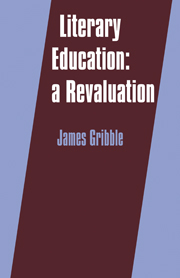Book contents
- Frontmatter
- Contents
- Acknowledgements
- Introduction Literature, life and education: some problems about how they relate to one another
- 1 Literature and truth
- 2 Literary criticism and literary education
- 3 Objectivity and subjectivity in literary education
- 4 The subordination of criticism to theory: structuralism and deconstructionism
- 5 Literature and the education of the emotions
- 6 Empathy and literary education
- 7 Literary intention and literary education
- 8 Literature, morality and censorship
- Notes
- Index
6 - Empathy and literary education
Published online by Cambridge University Press: 01 June 2011
- Frontmatter
- Contents
- Acknowledgements
- Introduction Literature, life and education: some problems about how they relate to one another
- 1 Literature and truth
- 2 Literary criticism and literary education
- 3 Objectivity and subjectivity in literary education
- 4 The subordination of criticism to theory: structuralism and deconstructionism
- 5 Literature and the education of the emotions
- 6 Empathy and literary education
- 7 Literary intention and literary education
- 8 Literature, morality and censorship
- Notes
- Index
Summary
Empathy and wish-fulfilment
Very central to the psychoanalytic concept of identification in real life is the idea of an endeavour, largely unconscious, to ‘mould a person's ego after the fashion of the one that has been taken as a model…’ Now, at first sight, it seems inherently implausible that a moulding or modelling of this sort (undoubtedly very important in real-life relationships) can play a significant part in our response to the reading of fiction. Surely it cannot reasonably be maintained that in ‘identifying’ with Catherine Morland (in Northanger Abbey) the middle-aged male reader wants to become like her. Yet, on reflection we can see that this difficulty arises from a failure to differentiate clearly enough between the real world and the fictional world. The reader who is in his right mind is fully aware that what he is doing is reading a novel, and that in whatever ways this activity may influence – either in the short term or the long term – the balance of forces within his own psyche, it cannot in the real world transform him into someone other than himself. Nevertheless, within the fictional world constructed for him by the words of the novelist, he may for a time be caught up by the wish to be some particular character in imagination, to share the consciousness, feelings and experience of this character, and to gain emotional satisfaction from the absorbed imaginative sympathy which accompanies this sharing. […]
- Type
- Chapter
- Information
- Literary EducationA Revaluation, pp. 114 - 131Publisher: Cambridge University PressPrint publication year: 1983

